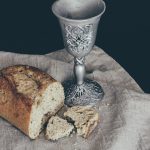If you’re a pastor, I don’t have to tell you that ministry is demanding. There’s sermon prep, counseling, managing staff, elders’ meetings, overseeing the budget, visiting the sick, and more. It can feel overwhelming. And the pressure is only intensified in church planting.
But an essential component to all healthy pastoral ministry is the simple—yet weighty—charge Paul gives to the Ephesian elders: “Pay careful attention to yourselves and all the flock, of which the Holy Spirit has made you overseers, to care for the church of God, which he obtained with his own blood” (Acts 20:28).
How can church planters heed Paul’s words, especially when there’s so much else to do?
Blood-Bought
First, we’d do well to notice how the church is described in Acts 20:28: “the church of God, which he obtained with his own blood.” The church itself is a beautiful portrait that manifests the gospel. We’re hopeless on our own, but God intervened. Christ’s blood purchased a people, rescuing them from slavery to sin and uniting them together as a family.
The church is a beautiful portrait that manifests the gospel.
One important implication, therefore, is that we pastors care for God’s church. It belongs to him, not us. He obtained it, and thus he ensures its ultimate good. The Holy Spirit does appoint overseers to shepherd God’s flock, but we would do well to embrace our role as those under the authority of the Chief Shepherd.
Shepherd’s Seasons
As we labor to care for the sheep, there’s much we can learn from actual shepherding work as a model for pastoral ministry. I’ve learned a lot from James Rebanks’s book, The Shepherd’s Life. Ministry seasons can mirror seasons of the year, not necessarily in the actual calendar, but in the overall rhythms of a church’s life.
For example, springtime is when “lambing” occurs, with lots of new life and heavy demands. It’s when shepherds work hard to ensure the lambs get off to a good start. Similarly, the early days of planting a church can be as exhilarating as they are hectic and tiring. But it’s only a season. If we perpetually live and work in ministry at the pace of the early days of planting, we will wear out the flock and destroy ourselves.
For shepherds, summer is a season of rest and preparation, in which hay is made for the coming year. In the same way, it’s important to cultivate seasons of intentional rest for churches, purposefully slowing things down. We’ve adopted a rhythm we call “Family Sundays”—we give our ministry teams a break, all children join us throughout the service, and we have a shorter sermon from one of the elders. Not only does it help our church to rest, but it’s also countercultural in the constant hustle of our city.
Autumn is when shepherds bring their sheep to competitions and auctions, and what they’ve worked hard for shows its value. I’m not suggesting there’s an exact parallel to ministry here, but there are seasons in a church’s life when long-planned strategies and hopes come to fruition. Celebration is an important discipline in caring well for the flock. The church-planting pastor should shepherd the church to give thanks to God, the Giver of every good and perfect gift (James 1:17).
Pastors have a responsibility to care for the flock, especially when it’s costly.
Winter is a brutal time of suffering and hardship for shepherds. They suffer alongside the sheep, at times wondering whether they’ll make it through. Pastors have a responsibility to care for the flock, especially when it’s costly. This has been the hardest lesson for me to learn in planting a church. Most of the stories we hear are more triumphalist, which seem to leave little room for thinking about real suffering. The dark winter nights, whether in the church or in my own soul, are often the most difficult times to keep shepherding. But nothing builds greater trust in a church than a well-navigated “winter” as shepherds care for the sheep, enduring suffering with them while pointing to Jesus.
Respond to Needs
As the old saying goes, if your only tool is a hammer, everything starts to look like a nail. Often, the zeal of church planters doesn’t reflect a full pastoral toolkit for meeting the needs of God’s people. At times, especially early on, the weighty responsibility to care for people can lead to “hovering over” them, trying to micromanage their holiness and pursuit of Christ.
But we must remember that it’s the Holy Spirit’s job to change hearts, convict people of sin, and breathe life into weary souls. There will be times when a pastor’s care for people calls for confrontation of sin in order to protect the unity and purity of the flock, and when wolves need to be fought off. Those fights are always costly.
There are also times when an angry sheep has an unseen wound that must be treated and cared for—when lethargy isn’t laziness but an indicator of a deeper melancholy that needs an encouraging word to lift a downcast spirit. Pastors should also remember that not all opposition is personal; some is rooted in fears that can be addressed and cared for with a gentle word to take courage. As a shepherd has to know his sheep, so a pastor needs to know his people.
The admonition to ‘pay careful attention to all the flock’ is the essence of pastoral ministry, and therefore church planting.
Paul’s call to the Thessalonians is helpful here: “And we urge you, brothers, admonish the idle, encourage the fainthearted, help the weak, be patient with them all” (1 Thess. 5:14).
Church-planting pastors must always remember that they are undershepherds of the Lord Jesus Christ. The admonition to “pay careful attention to all the flock” is the essence of pastoral ministry, and therefore church planting. It’s not an extraneous demand on top of the already full to-do list.
Even in the pressure-packed work of planting a church, remain focused on this high calling. Humbly press on and the Chief Shepherd himself will carry you through to an unfading reward.




































